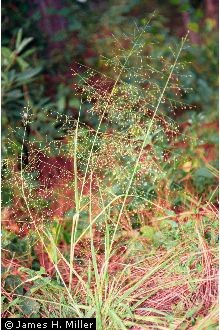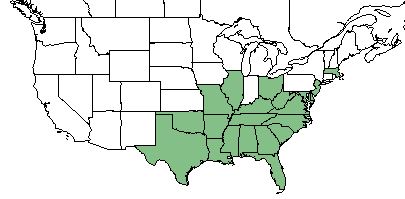Difference between revisions of "Eragrostis hirsuta"
HaleighJoM (talk | contribs) (→Ecology) |
(→Taxonomic Notes) |
||
| (4 intermediate revisions by the same user not shown) | |||
| Line 19: | Line 19: | ||
}} | }} | ||
==Taxonomic Notes== | ==Taxonomic Notes== | ||
| − | Synonyms: none | + | Synonyms: none<ref name=weakley>Weakley, A.S. 2020. Flora of the Southeastern United States. Edition of 20 October 2020. University of North Carolina at Chapel Hill, Chapel Hill, North Carolina.</ref> |
| − | Varieties: | + | Varieties: ''Eragrostis hirsuta'' var. ''hirsuta''; ''E. hirsuta'' var. ''laevivaginata'' Fernald<ref name=weakley/> |
==Description== | ==Description== | ||
| Line 28: | Line 28: | ||
==Distribution== | ==Distribution== | ||
| − | ''E. hirsuta'' can be found along the southeastern coast of the United States from Texas to Massachusetts, excluding Indiana and Pennsylvania.<ref name= "USDA Plant Database"/> It is also native to Central America.<ref name= | + | ''E. hirsuta'' can be found along the southeastern coast of the United States from Texas to Massachusetts, excluding Indiana and Pennsylvania.<ref name= "USDA Plant Database"/> It is also native to Central America.<ref name=weakley/> |
==Ecology== | ==Ecology== | ||
===Habitat=== <!--Natural communities, human disturbed habitats, topography, hydrology, soils, light, fire regime requirements for removal of competition, etc.--> | ===Habitat=== <!--Natural communities, human disturbed habitats, topography, hydrology, soils, light, fire regime requirements for removal of competition, etc.--> | ||
| − | ''E. hirsuta'' is found in fields, roadsides, clearings, and disturbed habitats. <ref name= | + | ''E. hirsuta'' is found in fields, roadsides, clearings, and disturbed habitats. <ref name=weakley/> Specimens have been collected from open flatwoods, small limestone glade, margin of shallow pond, open sand of vacant lot and other disturbed areas, hardwood hammock, mixed hardwood forest, and pine-oak woods. <ref name = "FSU herbarium"> URL: http://herbarium.bio.fsu.edu. Last accessed: June 2018. Collectors: Loran C. Anderson, Wilson Baker, R.K. Godfrey, Angus Gholson, Gary Knight, R.Kral, Richard Mitchell, Sidney McDaniel, Travis MacClendon, G. Wilder, K. MacClendon, Richard R. Clinebell II, D.L. Martin, S.T> Cooper, Ann F. Johnson, R.A. Norris, Cecil Slaughter, Bob Farley, M.J. Quinones. States and counties: Florida (Jefferson, Jackson, Clay, Leon, Franklin, Walton, Levy, Gadsden, Escambia, Suwannee, Dixie, Liberty, Taylor, Clahoun, Marion, St. Johns, Gulf) South Carolina (Richland) Georgia (Thomas, Grady)</ref> It is listed by the USDA Natural Resources Conservation Service as a facultative upland species, where it most often can be found in non-wetland habitats but can occasionally be found in wetland areas.<ref name= "USDA Plant Database"/> |
Associated species include ''Aristida'' sp., ''Eragrostis elliottii'', ''Eragrostis oxylepis'', ''Eragrostis'' sp., ''Sporobolus'' sp., ''Juniperus'' sp., ''Paronychia'' sp., ''Croton'' sp., ''Vaccinium stamineum'', ''Pterocaulon'' sp., ''Helenium amarum'', ''Elephantopus nudatus'', ''Muhlenbergia capillaris'', ''Schoenus nigricans'', and others.<ref name= "FSU herbarium"/> | Associated species include ''Aristida'' sp., ''Eragrostis elliottii'', ''Eragrostis oxylepis'', ''Eragrostis'' sp., ''Sporobolus'' sp., ''Juniperus'' sp., ''Paronychia'' sp., ''Croton'' sp., ''Vaccinium stamineum'', ''Pterocaulon'' sp., ''Helenium amarum'', ''Elephantopus nudatus'', ''Muhlenbergia capillaris'', ''Schoenus nigricans'', and others.<ref name= "FSU herbarium"/> | ||
===Phenology=== <!--Timing off flowering, fruiting, seed dispersal, and environmental triggers. Cite PanFlora website if appropriate: http://www.gilnelson.com/PanFlora/ --> | ===Phenology=== <!--Timing off flowering, fruiting, seed dispersal, and environmental triggers. Cite PanFlora website if appropriate: http://www.gilnelson.com/PanFlora/ --> | ||
| − | This species generally flowers from July until October.<ref name= | + | This species generally flowers from July until October.<ref name=weakley/> |
===Seed dispersal=== | ===Seed dispersal=== | ||
Latest revision as of 13:05, 26 May 2023
Common name: bigtop lovegrass [1]
| Eragrostis hirsuta | |
|---|---|

| |
| Photo from USDA NRCS Plants Database | |
| Scientific classification | |
| Kingdom: | Plantae |
| Division: | Magnoliophyta - Flowering plants |
| Class: | Liliopsida - Moncots |
| Order: | Poales |
| Family: | Poaceae |
| Genus: | Eragrostis |
| Species: | E. hirsuta |
| Binomial name | |
| Eragrostis hirsuta Michx. | |

| |
| Natural range of Eragrostis hirsuta from USDA NRCS Plants Database. | |
Contents
Taxonomic Notes
Synonyms: none[2]
Varieties: Eragrostis hirsuta var. hirsuta; E. hirsuta var. laevivaginata Fernald[2]
Description
E. hirsuta is a perennial graminoid of the Poaceae family native to North America. [1]
Distribution
E. hirsuta can be found along the southeastern coast of the United States from Texas to Massachusetts, excluding Indiana and Pennsylvania.[1] It is also native to Central America.[2]
Ecology
Habitat
E. hirsuta is found in fields, roadsides, clearings, and disturbed habitats. [2] Specimens have been collected from open flatwoods, small limestone glade, margin of shallow pond, open sand of vacant lot and other disturbed areas, hardwood hammock, mixed hardwood forest, and pine-oak woods. [3] It is listed by the USDA Natural Resources Conservation Service as a facultative upland species, where it most often can be found in non-wetland habitats but can occasionally be found in wetland areas.[1]
Associated species include Aristida sp., Eragrostis elliottii, Eragrostis oxylepis, Eragrostis sp., Sporobolus sp., Juniperus sp., Paronychia sp., Croton sp., Vaccinium stamineum, Pterocaulon sp., Helenium amarum, Elephantopus nudatus, Muhlenbergia capillaris, Schoenus nigricans, and others.[3]
Phenology
This species generally flowers from July until October.[2]
Seed dispersal
This species is thought to be dispersed by gravity. [4]
Seed bank and germination
E. hirsuta has been found in the seed bank of its native communities even when herbaceous vegetation is not found.[5]
Herbivory and toxicology
E. hirsuta consists of approximately 2-5% of the diet for various terrestrial birds.[6]
Conservation, cultivation, and restoration
Cultural use
Photo Gallery
References and notes
- ↑ 1.0 1.1 1.2 1.3 USDA Plant Database https://plants.usda.gov/core/profile?symbol=ERHI
- ↑ 2.0 2.1 2.2 2.3 2.4 Weakley, A.S. 2020. Flora of the Southeastern United States. Edition of 20 October 2020. University of North Carolina at Chapel Hill, Chapel Hill, North Carolina.
- ↑ 3.0 3.1 URL: http://herbarium.bio.fsu.edu. Last accessed: June 2018. Collectors: Loran C. Anderson, Wilson Baker, R.K. Godfrey, Angus Gholson, Gary Knight, R.Kral, Richard Mitchell, Sidney McDaniel, Travis MacClendon, G. Wilder, K. MacClendon, Richard R. Clinebell II, D.L. Martin, S.T> Cooper, Ann F. Johnson, R.A. Norris, Cecil Slaughter, Bob Farley, M.J. Quinones. States and counties: Florida (Jefferson, Jackson, Clay, Leon, Franklin, Walton, Levy, Gadsden, Escambia, Suwannee, Dixie, Liberty, Taylor, Clahoun, Marion, St. Johns, Gulf) South Carolina (Richland) Georgia (Thomas, Grady)
- ↑ Kirkman, L. Katherine. Unpublished database of seed dispersal mode of plants found in Coastal Plain longleaf pine-grasslands of the Jones Ecological Research Center, Georgia.
- ↑ Andreu, M. G., et al. (2009). "Can managers bank on seed banks when restoring Pinus taeda L. plantations in Southwest Georgia?" Restoration Ecology 17: 586-596.
- ↑ Miller, J.H., and K.V. Miller. 1999. Forest plants of the southeast and their wildlife uses. Southern Weed Science Society.